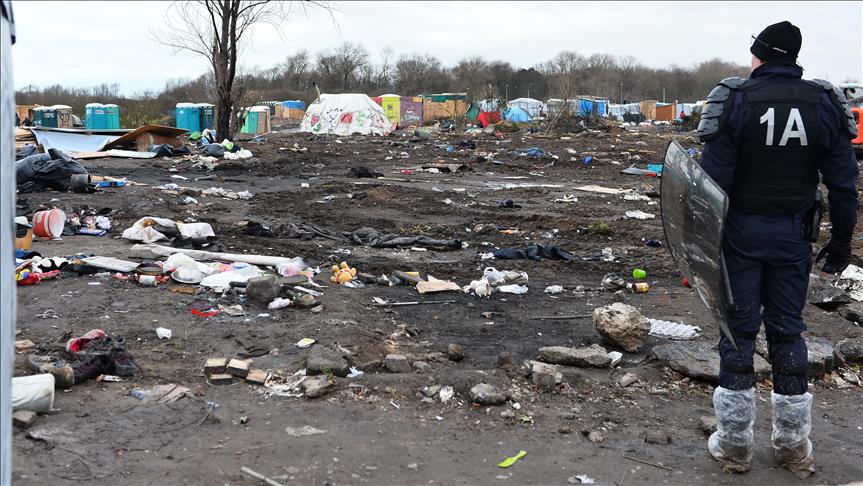Calais Jungle camp: Amid demolition, dreams don't die
Refugees tell about their hopes and determination to continue a ‘regular’ life even as their homes are destroyed
 Workers and police officers clear part of the Jungle refugee camp on March 10, 2016 in Calais, France. France continue to dismantle parts of the refugee camp and relocate refugees to purpose-built accommodations.
( Mustafa Yalçın - Anadolu Ajansı )
Workers and police officers clear part of the Jungle refugee camp on March 10, 2016 in Calais, France. France continue to dismantle parts of the refugee camp and relocate refugees to purpose-built accommodations.
( Mustafa Yalçın - Anadolu Ajansı )
Ile-de-France
By Hajer M’tiri - Fatma Esma Arslan
CALAIS, France
As bulldozers and demolition teams, supported by crowds of scores of police, continue to clear the southern part of France’s "Jungle" camp, refugees seem to be unshaken and insisting on carrying on their daily life.
French authorities had started the demolition of the southern part of the camp -- with 3,450 residents, including 300 unaccompanied children -- late last month, in a bid to reduce the population of the camp to 2,000 people who would be moved into refitted shipping containers set up nearby.
A new settlement that refugees and activists oppose strongly, criticizing it as unrealistic.
After watching the place he called home for the last five months fall apart, Mohamed, 59, a Turkmen from Aleppo, Syria, has moved to the new “containers camp”.
As almost 5,500 refugees live in the camp, Mohamed is not here with the intention of staying. France is just a transit stage; crossing to the UK is his goal.
“Containers offer better living conditions than tents in the southern part,” Mohamed told Anadolu Agency on Thursday.
But he continued to express his shock and disappointment at the treatment of refugees by French authorities.
"I never imagined France would be like this. We live in misery, in the cold and mud. My main goal is to reach the U.K. and save my family. I tried five times since my arrival, I even hid in the pipes with other migrants, but police dogs found us every time," he said.
Mohamed said he left Aleppo with his family, who are now living in a refugee camp in Lebanon, while he sneaked to Greece from Izmir, Turkey via a smuggling boat.
Recounting the boat trip, a memory that still haunts him, Mohamed said, "The boat ran out of fuel while we were at sea. There were 50 of us in a boat that should hold only 10. At that time, I thought of my children and my mother. I even wondered if the authorities would be able to find my body. Fortunately, a Greek fishing boat gave us gasoline and we reached the coast. "
Mohamed said his worries and fears are rising now with the dismantling of the “Jungle.”
“I listened to my mother’s advice to move to the new camp and not stay in the tent in fear for my safety,” Mohamed explained.
- Surviving the demolition
Except for the muddy roads, walking around the Jungle is no different than walking around any normal town.
Let’s put it this way: You have the residential areas -- tents and tin and wooden cabins. When you get hungry, no problem, you can just grab a kebab at the crowded restaurants run mostly by Afghan and Pakistani refugees.
If you need a haircut or beard trim, "Arab barber" is the place to go, and if you have enough pocket money, well it must be your lucky day, you can enjoy smoking a pack of cigarettes for just one euro.
Looking for more entertainment, you can drop by the "I love Afghan" cafe for a hot drink, smoke a shisha, have a chat, or play cards as you watch a Bollywood movie on TV.
And then on your way home, you might buy some fruits and chocolate from Abdullah’s corner store. There, a message written in different colors on a whiteboard hanging on the store door hits you.
"I’m thinking about the world. How we can live. I hope that everyone can be treated equally," says the message.
Anadolu Agency website contains only a portion of the news stories offered to subscribers in the AA News Broadcasting System (HAS), and in summarized form. Please contact us for subscription options.

